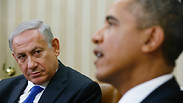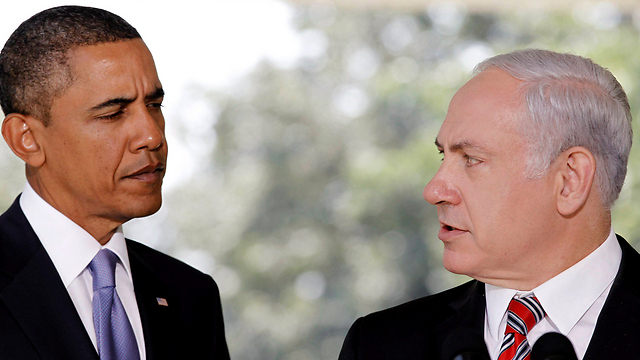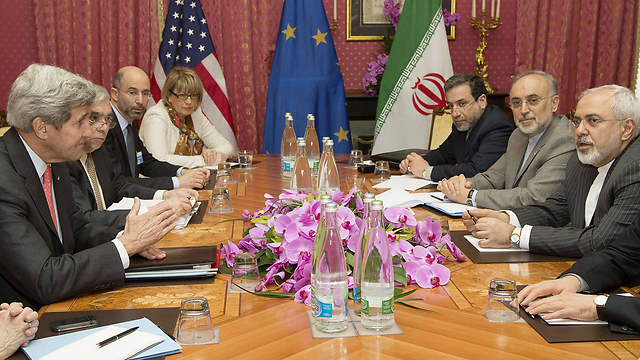
Israel denies report it spied on US-Iran nuclear talks
Defense Minister Ya'alon says 'there is no way' Israel would spy on its top ally, saying divisive forces behind report: 'Someone has an interest in sparking a dispute.'
Israeli officials on Tuesday denied a report that the country spied on the United States' handling of sensitive negotiations over Iran's nuclear program, moving to contain a new crisis that threatened to deepen a widening rift between the two allies.
The report in the Wall Street Journal has come at a difficult time for US-Israel relations. Prime Minister Benjamin Netanyahu has been feuding with the White House over an emerging nuclear deal with Iran, and he has come under fire for comments he made in the final days of Israel's parliamentary election campaign last week.
Reacting to the report, Defense Minister Moshe Ya'alon said "there is no way" that Israel spied on its closest and most important ally. Ya'alon, a former military chief and head of military intelligence, noted that Israel has received no complaints from the US, which he said would be expected in such a case.
Ya'alon said it has been "strictly forbidden" by all Israeli leaders over the past two decades - especially the current government - not to spy on the Americans.
"I am sorry it came out this way," he said. "Apparently someone has an interest in sparking a dispute, or creating a bad atmosphere in our relations," he said.
The US has been leading world powers in negotiations aimed at curbing Iran's suspect nuclear program. Israel, which believes Iran is trying to develop a nuclear bomb, believes the deal being negotiated would leave much of Iran's nuclear infrastructure in place and allow it to become a "threshold" state capable of building a bomb.
Prime Minister Benjamin Netanyahu has called it a "bad deal" and has lobbied against it - most notably in a speech to the US Congress early this month that was delivered over White House objections.
Iran says its nuclear program is for peaceful purposes only - a claim that has been received with skepticism by much of the international community.
In its report, the Wall Street Journal report said Israel had penetrated the talks and used the information to build a case against the deal. It said the White House was especially upset that Israel had shared the information with US lawmakers and others to undercut support for the negotiations.
Netanyahu's speech to Congress, in which he voiced harsh criticism of the nuclear deal, was organized with Republican Party leaders behind the back of the White House.
The leader of the US House of Representatives John Boehner sad he was "baffled" by reports, adding that that he was not aware of any spying.
The Journal reported Israel's Ambassador to the US, Ron Dermer, briefed US lawmakers and their aides on secret information from the talks - including how the deal could allow Iran to operate about 6,500 centrifuges and would permit Tehran to deploy advanced IR-4 centrifuges that could process nuclear material on a larger scale, according to congressional officials who participated in the briefings.
But Israel's Washington Embassy denied the report, with spokesman Aaron Sagui telling the Journal: "Ambassador Dermer never shared confidential intelligence information with members of Congress. His briefings did not include specific details from the negotiations, including the length of the agreement or the number of centrifuges Iran would be able to keep."
Netanyahu's office has called the spying report "utterly false," saying Israel "does not conduct espionage against the United States or Israel's other allies."
Israel has said it doesn't spy on the US since Jonathan Pollard, a civilian analyst for the US Navy, was convicted of spying for Israel in the 1980s. The case was one of the most damaging episodes in US-Israeli relations and remains a sore spot in some American circles.
Avigdor Lieberman Foreign Minister said in a radio interview Tuesday that the information in question had come from other parties in the talks, not the US.
"This report is not true. Obviously Israel has security interests to defend and we have our own intelligence. But we do not spy on the United States. There are enough participants in these negotiations, including Iranians," he said. "We got our intelligence from other sources, not from the United States. The instruction has been clear for decades now: you don't spy on the United States, directly or indirectly."
The Wall Street Journal reported that the Obama administration was less concerned with the fact Israel spied on the talks and more concerned by Israel leaking this confidential information to American lawmakers and others in order to build a case against the deal being negotiated.
"It is one thing for the US and Israel to spy on each other. It is another thing for Israel to steal US secrets and play them back to US legislators to undermine US diplomacy," the Journal quoted a senior US official as saying.
A New York Times report last month cited Israeli officials saying the United States had limited what it was sharing with them about the talks and a European official saying he had been warned by Washington to be careful what he shared for fear of it being selectively leaked.
Following the report in the Times, the White House slammed Israel for "a continued practice of cherry-picking specific pieces of information and using them out of context to distort the negotiating position of the United States."
The Associated Press contributed to this report












